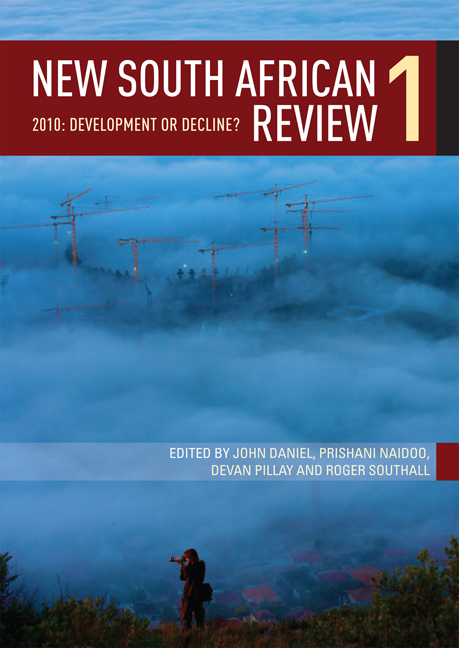Book contents
- Frontmatter
- Contents
- Preface
- Introduction South Africa 2010: From short-term success to long-term decline?
- PART 1 ECONOMY, ECOLOGY AND SUSTAINABILITY
- PART 2 STATE, POLITICS AND POLICY
- INTRODUCTION The politics and challenges of delivery
- CHAPTER 6 The African National Congress under Jacob Zuma
- CHAPTER 7 Indigent management: A strategic response to the struggles of the poor in post-apartheid South Africa
- CHAPTER 8 Fear, enervation and the systematisation of disorder: Challenges to reforming the Department of Home Affairs
- CHAPTER 9 The mobile nation: How migration continues to shape South Africa
- CHAPTER 10 South African female peacekeepers: An exploration of their experiences in the Democratic Republic of Congo
- PART 3 EDUCATION, HEALTH AND LAND
- PART 4 Doreen Atkinson
- Contributors
- Index
CHAPTER 6 - The African National Congress under Jacob Zuma
from PART 2 - STATE, POLITICS AND POLICY
Published online by Cambridge University Press: 21 April 2018
- Frontmatter
- Contents
- Preface
- Introduction South Africa 2010: From short-term success to long-term decline?
- PART 1 ECONOMY, ECOLOGY AND SUSTAINABILITY
- PART 2 STATE, POLITICS AND POLICY
- INTRODUCTION The politics and challenges of delivery
- CHAPTER 6 The African National Congress under Jacob Zuma
- CHAPTER 7 Indigent management: A strategic response to the struggles of the poor in post-apartheid South Africa
- CHAPTER 8 Fear, enervation and the systematisation of disorder: Challenges to reforming the Department of Home Affairs
- CHAPTER 9 The mobile nation: How migration continues to shape South Africa
- CHAPTER 10 South African female peacekeepers: An exploration of their experiences in the Democratic Republic of Congo
- PART 3 EDUCATION, HEALTH AND LAND
- PART 4 Doreen Atkinson
- Contributors
- Index
Summary
Jacob Zuma has been president of the African National Congress (ANC) since December 2007 and state president of South Africa since April 2009. His rise to these offices was accompanied by some of the most turbulent politics that the liberation movement has experienced since the transitional upheavals of the early 1990s.
Zuma's personal journey to the state presidency was an extraordinary one (Gordin 2008).
As many of his supporters quickly came to recognise, however, he is a leader with serious political and personal limitations. The thrilling tale that ended at Polokwane was more enthralling – and will perhaps prove more historically significant – than Zuma's troubled incumbency in the Union Buildings.
This chapter is divided into five main sections. First, it surveys the legacy of former ANC and state president Thabo Mbeki, an activist leader whose administrations significantly shaped both the character of the ANC as a liberation movement and the nature of the contemporary South African state. The rise of Zuma – and the challenges he now confronts – cannot be understood in isolation from the actions and plans of his controversial predecessor. Where Mbeki failed, he created fertile ground for discontent. When he succeeded, he nevertheless generated antagonisms.
Secondly, the chapter explains Zuma's ascendancy within the ANC. It explores the fault lines created during Mbeki's presidency and demonstrates how the former president's actions, in trying to manage the ANC and state successions, created opportunities for Zuma to build a coalition of support. The struggle between Mbeki's incumbent faction and Zuma's disparate alliance culminated at the ANC's tumultuous fifty-second national conference at Polokwane in December 2007 with a decisive defeat for Mbeki – but a less clear-cut victory for Zuma.
In a third section, the chapter traces the trajectory of the ANC after Polokwane. Although the incoming senior leadership compared favourably to the outgoing ‘top six’, the uneven overall composition of the National Executive Committee (NEC) was quite widely, if not particularly astutely, criticised. The new leaders rapidly and quite successfully limited the damage caused by personal and factional rifts, and managed the ramifications of breakaway politics for the unity of the movement.
Fourth, we explore the culmination of this process of healing in the general election campaign of 2009.
- Type
- Chapter
- Information
- New South African Review2010: Development or Decline?, pp. 164 - 183Publisher: Wits University PressPrint publication year: 2010



